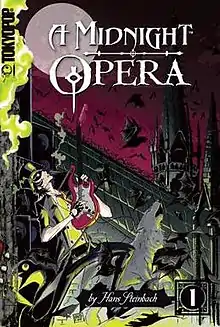A Midnight Opera
A Midnight Opera is an original English-language (OEL) manga by Hans Steinbach. It was published by Tokyopop in North America from November 8, 2005 to November 7, 2006.
| A Midnight Opera | |
|---|---|
 Cover of A Midnight Opera vol. 1 (2005), art by Hans Steinbach | |
| Genre | |
| Author | Hans Steinbach |
| Publisher | |
| Demographic | Teens |
| Original run | 2005 – 2006 |
| Volumes | 3 |
Plot
The series focuses on two brothers, Ein and Leroux DeLaLune.
Development
Born in Syria, Hans Steinbach lived in many countries, including Germany, France, Turkey and Canada, before moving to the United States; there, he decided to submit a story idea to Tokyopop after seeing it was a major publisher in the States. Steinbach considered the story "a little too straight forward, too linear".[1] Because it heavily focused on the missions Einblick carried out for the Catholic Church, Steinbech rewrote it, with help from his editor at Tokyopop, to allow Einblick's personality to develop. He changed Einblick from an assassin to "an undead, chain-smoking metalhead with a grudge".[1] Steinbach was inspired by Phantom of the Opera, since it combined horror and music, something Steinbach wanted to do for A Midnight Opera. His goal for the series was "to combine fact and fiction, historical facts with fictitious (and not so fictitious) characters".[1]
Steinbach has been drawing since the age of ten and his art is influenced by manga artists, particularly Go Nagai and Akira Toriyama.[2] Additionally, he is influenced by classical and metal music as well as the musician Yngwie Malmsteen and the bands Dark Moor, Metallica, Symphony X, Iron Maiden, Stratovarius, Blind Guardian, Rhapsody, and Judas Priest.[1]
Media
OEL manga
Written and illustrated by Hans Steinbach, A Midnight Opera was published in North America by Tokyopop from November 8, 2005 to November 7, 2006.[3] However, as of August 31, 2009, the series is out-of-print.[4] In New Zealand and Australia, the series is distributed by Madman Entertainment.[5] The series is also licensed in Germany by Tokyopop Germany,[6] and in Hungary by Mangattack.[7]
Volume list
| No. | Release date | ISBN |
|---|---|---|
| 01 | November 8, 2005[3] | 978-1-59816-265-3 |
| 02 | April 11, 2006[3] | 978-1-59816-471-8 |
| 03 | November 7, 2006[3] | 978-1-4278-0007-7 |
Animated shorts
Menfond Electronic Art adapted A Midnight Opera into animated short episodes. The episodes premiered on My Space along with the short episodes of Bizenghast, I Luv Halloween, and Riding Shotgun in summer 2007.[8]
Reception
A Midnight Opera received mixed reviews from critics. About.com's Katherine Luther praised the series as "a gothic horror manga full of thrills, chills and okay, a little gore" and more appropriate for older readers.[9] While noting that the plot and art lacked originality, KJB of IGN stated: "Steinbach has managed to take all of those elements and create a final product that is interesting enough to sit through until the last page."[10] Manga Life's Craig Johnson commented on the "brave and experimental" art and that "the story is not as revolutionary as the art...neither is it accessible."[11] Zac Bertschy of Anime News Network heavily criticized the series as "[h]orrifically clichéd and hackneyed, with laughably bad dialogue and interior art", and wrote: "It's hard to tell if A Midnight Opera is an exercise in plain marketing hubris—pandering directly to the Hot Topic crowd—or simply a case of the author taking himself and his work far too seriously and churning out cliché after cliché, convinced of his own genius, unaware of the tripe he's created."[12]
References
- Ong Pang Kean, Benjamin (5 July 2005). "Hanzo's A Midnight Opera". Newsarama. Archived from the original on 21 November 2008. Retrieved 30 January 2010.
- "Manga+Comics: A Midnight Opera". Tokyopop. Archived from the original on 11 January 2010. Retrieved 16 January 2010.
Though Hans has had no formal art training, he has been doodling ever since he was ten and in the last eleven years has forged a unique style from his innate talent, worldly experiences and a passion for music... Hans' art sensibilities have been strongly influenced by Japanese artists, especially Go Nagai (Devilman) and Akira Toriyama (Dragon Ball)
- "Manga+Comics: Book Catalog". Tokyopop. Archived from the original on February 14, 2010. Retrieved 16 January 2010.
- "Corporate: Biz Dev". Tokyopop. Archived from the original on 12 June 2010. Retrieved 23 June 2010.
- "A Midnight Opera (Manga)". Madman Entertainment. Retrieved 16 January 2010.
- "Bücher: Manga: A Midnight Opera" [Books: Manga: A Midnight Opera] (in German). Tokyopop Germany. Archived from the original on 4 August 2009. Retrieved 17 January 2010.
- "Éjféli opera 1" (in Hungarian). Mangattack. Archived from the original on 12 September 2008. Retrieved 17 January 2010.
- "Tokyopop Posts World-Manga-Based Animation on MySpace". Anime News Network. 16 July 2007. Retrieved 10 January 2010.
- Luther, Katherine (20 November 2005). "A Midnight Opera". About.com. Retrieved 16 January 2010.
- KJB (28 October 2005). "A Midnight Opera: Act 1 Review". IGN. Retrieved 16 January 2010.
- Johnson, Craig. "A Midnight Opera v1 Review". Manga Life. Archived from the original on 17 May 2006. Retrieved 17 January 2010.
- Bertschy, Zac (25 October 2005). "A Midnight Opera - Review". Anime News Network. Retrieved 17 January 2010.
External links
- A Midnight Opera at Tokyopop's website
- A Midnight Opera #1: Prelude to Good vs. Evil at YouTube